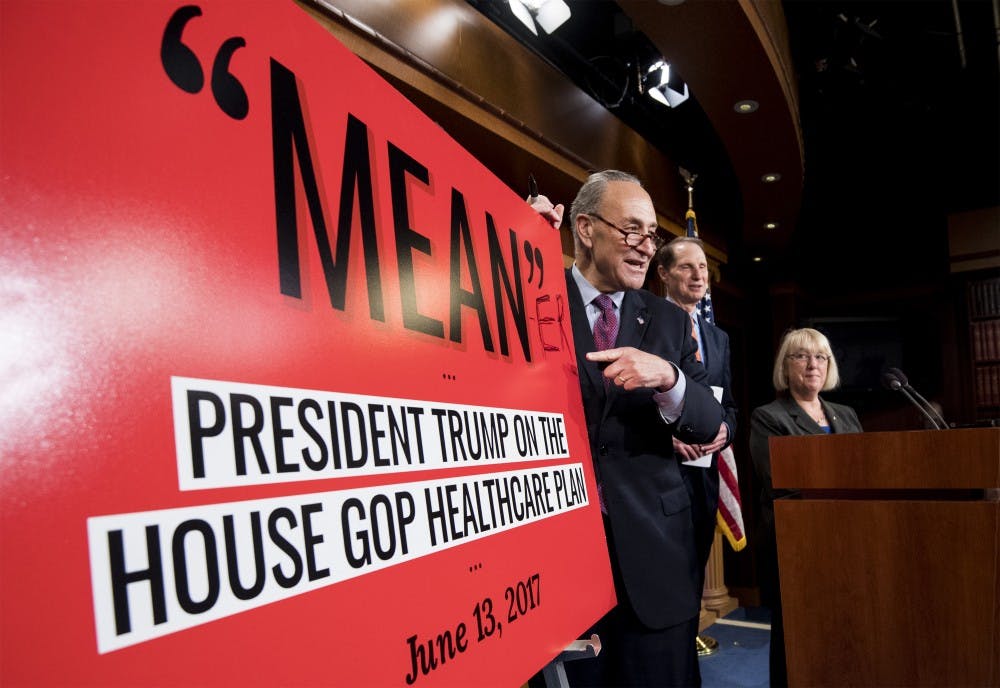WASHINGTON — The Senate health care bill to replace the Affordable Care Act would likely cause millions of Americans to lose their Medicaid and private insurance marketplace coverage. It also could make coverage more expensive for many sicker, older and low-income individuals.
The closely guarded draft of the Senate legislation was released Thursday morning, revealing some significant revisions to the widely panned American Health Care Act that narrowly passed the House of Representatives in May — but staying in line with the Republican push to cut taxes and phase out Medicaid expansion.
Negotiated in secret by a hand-picked group of 13 male senators with little input from patient advocacy groups, hospitals and care providers, the legislation hews closely to the AHCA by cutting subsidies that help purchase marketplace insurance, phasing out the Medicaid expansion and proposing even deeper cuts to Medicaid than the reduction sought in the House legislation.
The legislation, named the Better Care Reconciliation Act, also would abolish most of the taxes that funded the Affordable Care Act's coverage expansion.
The hits to lower-income, sick and older Americans, coupled with the secrecy, haste and lack of debate that surrounded the Senate bill's creation, will make it hard for moderate Republicans to vote for the measure in a possible floor vote next Thursday. Senate Majority Leader Mitch McConnell can afford to lose just two Republican votes, and quite a few already are skeptics.
And even if the legislation does pass the Senate, it will face tough sledding in the House, where a more conservative version barely passed in May.
A Congressional Budget Office analysis of the Senate bill's cost and impact is expected soon. The AHCA would leave 23 million people without health coverage and slash Medicaid's budget by $834 billion over 10 years, the CBO found.
A disappointing CBO score for the Senate bill would only compound the pressure facing wary Republicans such as Rand Paul of Kentucky, Shelley Moore Capito of West Virginia, Rob Portman of Ohio, Susan Collins of Maine and Lisa Murkowski of Alaska.
Collins' spokeswoman, Annie Clark, immediately issued a statement Thursday saying the senator has quite a few concerns and will review the bill this weekend. Collins "will be particularly interested in examining the forthcoming CBO analysis on the impact on insurance coverage, the effect on insurance premiums, and the changes in the Medicaid program," Clark wrote.
Republican Sen. Dean Heller of Nevada, who's up for re-election in 2018, will also face some soul-searching over his vote.
"At first glance, I have serious concerns about the bill's impact on the Nevadans who depend on Medicaid," Heller said in a statement. "I will read it, share it with Governor Sandoval, and continue to listen to Nevadans to determine the bill's impact on our state. I will also post it to my website so that any Nevadans who wish to review it can do so. As I have consistently stated, if the bill is good for Nevada, I'll vote for it and if it's not — I won't."
Sen. Orrin Hatch, R-Utah, expressed optimism the bill would get the 50 votes needed to pass the senate under special budget rules. But most senators said they haven't read the text of the legislation and withheld comment about their support.
President Donald Trump, asked about the bill during a brief appearance at the White House, was short: "A little negotiation, but it's going to be very good."
Senate Democrats will be sure to pound their GOP colleagues about the rushed legislation in the run up to the vote.
"I can certainly understand why Republican leaders don't want to give people time to see what is in this bill — and why they don't even want to give their own members time to see how much their constituents hate it," Sen. Patty Murray, D-Wash., the ranking member of the Senate HELP committee, said on the floor of the Senate on Thursday.
Like Obamacare, the Senate bill will base tax credits to buy marketplace insurance on financial need rather than age as the House bill does.
But the bill will provide smaller subsidies, and fewer people will receive them because in 2020 the legislation cuts eligibility at 350 percent of the federal poverty level compared to 400 percent under the Affordable Care Act.
"I still have to see what the generosity of the (tax) credits are so that as (the Medicaid expansion) is scaled back, we don't lose the ability for lower income folks to be able to afford insurance. And that's why I need to review the text," said Sen. Bill Cassidy, R-La.
The House bill allows states to opt out of requirements that insurers provide 10 "essential health benefits" and would allow insurers to charge higher rates to people with pre-existing medical conditions.
The Senate bill would give states more power to run their health care systems outside of ACA regulations, but the authority to do so would come under an existing provision of the health law, "Section 1332," which allows states to waive key provisions of the law.
The Senate legislation also would reimburse insurers for billions of dollars in cost-sharing subsidies they'll pay to help low-income enrollees pay for coverage in 2018 and 2019. The Trump administration had thus far balked at paying the money.
Taxes that funded the Affordable Care Act's coverage expansion would be eliminated under the Senate bill except the 40 percent "Cadillac tax" on high-cost health plans. That will anger employer groups who pushed for a repeal of the tax.
The bill is expected to cut Medicaid spending by phasing out the Obamacare Medicaid expansion over three years beginning in 2021. That's slower than the House bill does.
The Senate bill also calls for changing Medicaid from an open-ended entitlement program in 2021 by putting a cap, or limit, on per-patient spending. The House bill did the same, but beginning in 2025, the Senate bill will use a different funding formula that slows spending growth even more than the House bill. By making the change in 2025, moderate Republicans wary of how the cuts will affect their states might be willing to sign on.
Cassidy said the delayed phaseout is better because it gives states more time to prepare for the loss of federal funding.
After being briefed on the legislation Thursday morning, Cassidy said the bill "allows Medicaid to grow at the rate of inflation. And that part I think everybody should be able to support."
But critics fear the Medicaid cuts, which are deeper than the House bill, will force states to either raise taxes to make up for the funding shortfall or limit enrollment and cut benefits and reimbursement rates for Medicaid providers in order to sustain the program
© 2017 McClatchy Washington Bureau. Visit the McClatchy Washington Bureau at www.mcclatchydc.com. Distributed by Tribune Content Agency, LLC.
Do you like this story? The Plainsman doesn't accept money from tuition or student fees, and we don't charge a subscription fee. But you can donate to support The Plainsman.




